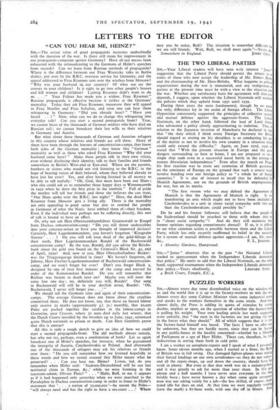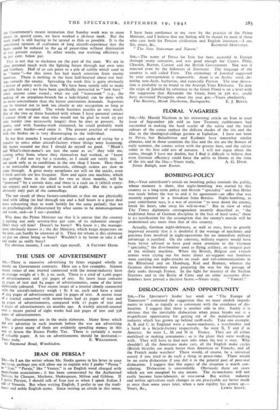PUZZLED WORKERS Six,—Almost every day some disembodied voice on the
wireless tells us and the world that it is up to the factory-workers to win the war. Almost every day some Cabinet Minister visits some industrial centre and speaks to the workers themselves in the same strain. And now, almost daily, the Press is adding its quota_ of stimulus by casting doubts, implicit or open, on the question of whether the. factory-hand is pulling his weight. Your own leading article last week suggested' most unfairly, that " the men in the factories are not giving the men in the forces what they should." All of which suggests that it is MIX the factory-hand himself was heard. The facts I have to offer maY be unknown, but they are hardly secret, since they can be learned in any public-house in the locality concerned—whether by a Member of Parliament or a spy of Herr Hitler. There can, therefore, be hole indiscretion in setting them forth in cold print.
I am a worker on aeroplane-repairs and I speak of what I personallY know. Some eleven months ago, when I started as a fitter, the Battle of Britain was in full swing. Our damaged fighter-planes were making their forced landings on our own aerodromes—as they do not today` and all the repair-shops, up and down the country, should have had work in plenty. But even at that date work was on a rationing-boo and it was greedy to ask for more than your share. In this pat eleven and a half months I have never seen everyone in the OP briskly busy ; have never known a day when some quite compet.01 man was not asking vainly for a job—the less skilled, of course, InIfbi stand idle for days on end. At that time we were regularly working. (save the mark) a 67-hour week, with one day off in fifteen. SO she Government's recent intimation that Sunday work was to cease except in special cases, we have worked a 58-hour week. But the work itself is still haying to be spread as thin as possible. It is the considered opinion of craftsmen of long aircraft-experience that the hours could be reduced to the 44 of peace-time without diminution of our present output. In other words, our working efficiency is 24 per cent. below par.
This is not due to slackness on the part of the men. We are in close personal touch with the fighting forces through our own sons and brothers. Half of us can point to a pile of rubble which used to be " home "—for this town has had much attention from enemy bombers. There is nothing in the least half-hearted about our feel- ings towards the enemy. Spreading the work thin is quite obviously a matter of policy with the firm. We have been openly told to make our jobs last out ; we have been specifically instructed to " look busy " when anyone came round ; what we call " homework " (e.g., the making of an aefoplane-brooch for a lady-friend) can be done with no more concealment than the barest convention demands. Superiors can be trusted not to look too closely at any occupation so long as the men are occupied. The whole business puzzles us very much. Out of the two or three hundred with whom I have personal contact I cannot think of one man who would not be glad to work 25 per cent. harder (not necessarily longer) than he does at present. In spurts, and with Sunday-work reinstated, he could probably work 50 per cent. harder—and enjoy it. The present practice of running with the brakes on is very discouraging to the individual.
In my first months I wearied of idleness and spoke of trying for a transfer to some other aircraft-factory where things were humming. My mates assured me that I should do myself no good. " Blank's and What's-their-name's are just the same as us," they told me, naming other firms where they themselves had worked, or " knew chaps." I did not try for a transfer, so I could not verify this. I can speak only as to conditions in the one shop I know. Here there is no noticeable shortage of materials, although orders are slow to come through. A great many aeroplanes are still on the stocks, even if fresh arrivals are less frequent. Now and again one machine, which has perhaps been in the shed for two or three months, will be "promised " by a certain date, and there is a rush on it (which every- one enjoys) and men are asked to work all night. But this is quite obviously only part of the camouflage.
The net result of these factory-conditions is that we are physically tired with idling (to loaf through ten and a half hours is a great deal more exhausting than to work briskly for the same period); that we are psychologically disheartened by what seems to be mismanagement and waste, and—as I say—puzzled.
Why does the Prime Minister say that it is untrue that the country is putting out only seventy-five per cent. of its industrial energy? Don't they tell him? Doesn't he know? We know it ; the manage- ment obviously knows it ; the Air Ministry, which keeps inspectors on the spot, can hardly be unaware of it. Then for whom is this elaborate act put on about being so busy? Wouldn't it be better to take it off and make us really busy?
For obvious reasons, I can only sign myself, A FACTORY HAND.



























 Previous page
Previous page